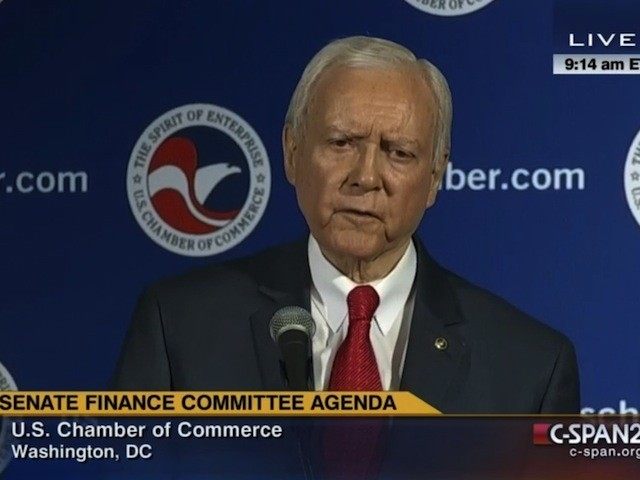A trade deal that some say Senate Republicans are attempting to fast-track through Congress might contain controversial immigration procedures.
On Thursday, the Senate Finance Committee held what Americans for Limited Government President Rick Manning called an unscheduled and unannounced “secret” hearing to discuss whether to provide President Obama with fast track trade authority. “Fast track limits the constitutional requirement for treaty ratification to a simple majority rather than a two-thirds Senate vote requirement,” warned Manning.
Manning was surprised that, during the hearing, the U.S. Trade Representative Michael Froman said there would not be increased immigration under the TransPacific Partnership. The U.S. Trade Representative website specifically lays out details for expedited entries for temporary entry visas for workers from other countries.
“There has been bi-partisan agreement dating back until at least 2003 that trade deals should not touch U.S. immigration law,” explained Manning. During the hearing, the U.S. Trade Representative was questioned by Sen. Chuck Grassley (R-IA) on the issue of temporary entry provisions regarding immigration.
The U.S. Trade Representative provided Breitbart News with a rough transcript of the exchange:
- Grassley: At the time of the Chilean-Singapore Free trade agreements there was a special carve out of H1B visas for those countries. We have reason to be concerned about overreach of this administration to unilaterally change our immigration laws. Could you assure the committee that the TPP agreement does not and will not contain any provisions related to immigration, visa processing, or temporary entries of persons?
- Froman: We are not negotiating anything in TPP that would require any modification of U.S. immigration laws or system, or visa systems, and TPP will explicitly state that it will not require any changes to countries’ immigration laws or procedures. The 11 other countries are making offers to each other in the area of temporary entry, but we have decided not to do so.
- Grassley: According to USTR’s website, and the outlines of the TPP agreement, countries have agreed on ‘provisions to promote transparency and efficacy in the processing of temporary entry’ and that ‘specific obligations related to individual categories in business persons are under discussion.’ Could you explain?
- Froman: The text of the temporary entry chapter contains provisions on visa processing and cooperating on border security. They’re all good governance provisions, and U.S. procedures are already consistent with those provisions. That is not an issue the U.S. will be making any offers on.
- Grassley: The U.S. is not negating immigration changes. Other countries are discussing the issue, if the U.S. signs the TPP are we bound to what other countries have agreed to with regard to temporary entry of people?
- Froman: What other countries are discussing are reciprocal agreements with each other. The U.S. has decided not to make any offers in that area.
- Grassley: If congress grants TPA to President Obama, could immigration provisions be included in future agreements, or is that precluded because of Congress’ plenary constitutional power over immigration?
- Froman: We haven’t seen the TPA Bill, but it is our expectation that we wouldn’t be doing anything in this area without Congress’ approval.
A spokesperson from the U.S. Trade Representative told Breitbart News: “On the “general provisions” mentioned in the “Temporary Entry” section of the TPP outlines document on USTR’s website — as Ambassador Froman made clear in the hearing today — these are good governance provisions that U.S. practices are already consistent with and would require no changes to current U.S. practices.
And regarding the language stating: “specific obligations related to individual categories of business person are under discussion,” the spokesperson said, “that language was addressed by Ambassador Froman when he made clear that while other TPP countries are discussing ‘reciprocal agreements with each other’ the U.S. is not.”
The hearing took place Thursday morning and was officially announced Wednesday, according to the committee’s press office. Breitbart News attempted to contact Hatch’s office for comment about the short warning given to reporters.
Manning charges the TransPacific Partnership ignores Congress. “This is just one more reason for Congress to reject fast track legislation and subject this treaty to the full weight of Senate scrutiny as prescribed in the U.S. Constitution,” said Manning.
Curtis Ellis, Executive Director of American Jobs Alliance, echoes Manning’s concern.
Ellis said this language is complex and the fast tracked hearing is going to leave Congress with only 20 hours to review this complex legislation. Ellis said it ”makes legal language look like nursery rhymes.”
Ellis also said, “U.S. Trade Representative Michael Froman directly stated to Senator Grassley that the TransPacific Partnership would not include any changes on immigration and so-called ‘temporary entry’ foreign workers.”
But Ellis, like Manning, argues that this is not true.
“The U.S. Trade Representative’s own web site says the TPP includes an entire chapter to make it easier to bring foreign workers into the U.S. to take jobs that could be filled by Americans. Froman is either lying to Senator Grassley or he’s lying on his web site,” said Ellis.
Ellis explains that every free trade agreement that has been negotiated by the US Trade Representative since 1994 includes immigration provisions, but Congress has repeatedly said this is unacceptable.
“President Obama has said he will use every means he can to advance his immigration agenda, and has said he will bypass Congress to do it. You’d have to be pretty naïve to believe he is not using the TransPacific Partnership to do it,” charged Ellis. “This is yet one more reason for Congress to reject giving this president fast track trade promotion authority and hold this president accountable.”

COMMENTS
Please let us know if you're having issues with commenting.